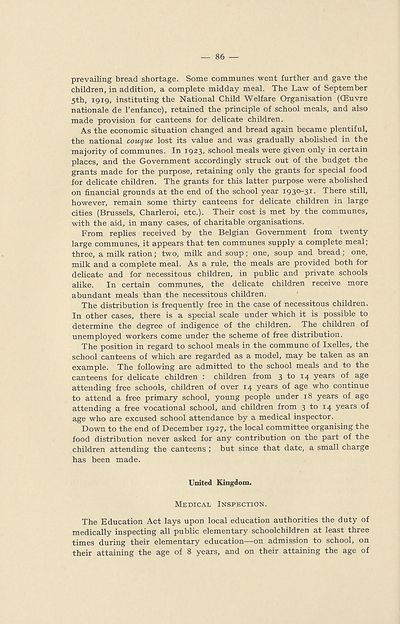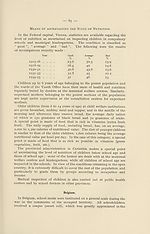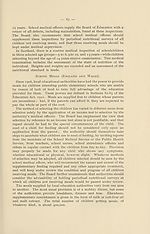Download files
Complete book:
Individual page:
Thumbnail gallery: Grid view | List view

— 86
prevailing bread shortage. Some communes went further and gave the
children, in addition, a complete midday meal. The Law of September
5th, 1919, instituting the National Child Welfare Organisation (CEuvre
nationale de I’enfance), retained the principle of school meals, and also
made provision for canteens for delicate children.
As the economic situation changed and bread again became plentiful,
the national couque lost its value and was gradually abolished in the
majority of communes. In 1923, school meals were given only in certain
places, and the Government accordingly struck out of the budget the
grants made for the purpose, retaining only the grants for special food
for delicate children. The grants for this latter purpose were abolished
on financial grounds at the end of the school year 1930-31. There still,
however, remain some thirty canteens for delicate children in large
cities (Brussels, Charleroi, etc.). Their cost is met by the communes,
with the aid, in many cases, of charitable organisations.
From replies received by the Belgian Government from twenty
large communes, it appears that ten communes supply a complete meal;
three, a milk ration; two, milk and soup; one, soup and bread; one,
milk and a complete meal. As a rule, the meals are provided both for
delicate and for necessitous children, in public and private schools
alike. In certain communes, the delicate children receive more
abundant meals than the necessitous children.
The distribution is frequently free in the case of necessitous children.
In other cases, there is a special scale under which it is possible to
determine the degree of indigence of the children. The children of
unemployed workers come under the scheme of free distribution.
The position in regard to school meals in the commune of Ixelles, the
school canteens of which are regarded as a model, may be taken as an
example. The following are admitted to the school meals and to the
canteens for delicate children : children from 3 to 14 years of age
attending free schools, children of over 14 years of age who continue
to attend a free primary school, young people under 18 years of age
attending a free vocational school, and children from 3 to 14 years of
age who are excused school attendance by a medical inspector.
Down to the end of December 1927, the local committee organising the
food distribution never asked for any contribution on the part of the
children attending the canteens ; but since that date, a small charge
has been made.
United Kingdom.
Medical Inspection.
The Education Act lays upon local education authorities the duty of
medically inspecting all public elementary schoolchildren at least three
times during their elementary education—on admission to school, on
their attaining the age of 8 years, and on their attaining the age of
prevailing bread shortage. Some communes went further and gave the
children, in addition, a complete midday meal. The Law of September
5th, 1919, instituting the National Child Welfare Organisation (CEuvre
nationale de I’enfance), retained the principle of school meals, and also
made provision for canteens for delicate children.
As the economic situation changed and bread again became plentiful,
the national couque lost its value and was gradually abolished in the
majority of communes. In 1923, school meals were given only in certain
places, and the Government accordingly struck out of the budget the
grants made for the purpose, retaining only the grants for special food
for delicate children. The grants for this latter purpose were abolished
on financial grounds at the end of the school year 1930-31. There still,
however, remain some thirty canteens for delicate children in large
cities (Brussels, Charleroi, etc.). Their cost is met by the communes,
with the aid, in many cases, of charitable organisations.
From replies received by the Belgian Government from twenty
large communes, it appears that ten communes supply a complete meal;
three, a milk ration; two, milk and soup; one, soup and bread; one,
milk and a complete meal. As a rule, the meals are provided both for
delicate and for necessitous children, in public and private schools
alike. In certain communes, the delicate children receive more
abundant meals than the necessitous children.
The distribution is frequently free in the case of necessitous children.
In other cases, there is a special scale under which it is possible to
determine the degree of indigence of the children. The children of
unemployed workers come under the scheme of free distribution.
The position in regard to school meals in the commune of Ixelles, the
school canteens of which are regarded as a model, may be taken as an
example. The following are admitted to the school meals and to the
canteens for delicate children : children from 3 to 14 years of age
attending free schools, children of over 14 years of age who continue
to attend a free primary school, young people under 18 years of age
attending a free vocational school, and children from 3 to 14 years of
age who are excused school attendance by a medical inspector.
Down to the end of December 1927, the local committee organising the
food distribution never asked for any contribution on the part of the
children attending the canteens ; but since that date, a small charge
has been made.
United Kingdom.
Medical Inspection.
The Education Act lays upon local education authorities the duty of
medically inspecting all public elementary schoolchildren at least three
times during their elementary education—on admission to school, on
their attaining the age of 8 years, and on their attaining the age of
Set display mode to:
![]() Universal Viewer |
Universal Viewer | ![]() Mirador |
Large image | Transcription
Mirador |
Large image | Transcription
Images and transcriptions on this page, including medium image downloads, may be used under the Creative Commons Attribution 4.0 International Licence unless otherwise stated. ![]()
| League of Nations > Economic and financial section > Problem of nutrition > (88) |
|---|
| Permanent URL | https://digital.nls.uk/190924906 |
|---|
| Shelfmark | LN.II |
|---|
| Description | Over 1,200 documents from the non-political organs of the League of Nations that dealt with health, disarmament, economic and financial matters for the duration of the League (1919-1945). Also online are statistical bulletins, essential facts, and an overview of the League by the first Secretary General, Sir Eric Drummond. These items are part of the Official Publications collection at the National Library of Scotland. |
|---|---|
| Additional NLS resources: |
|

